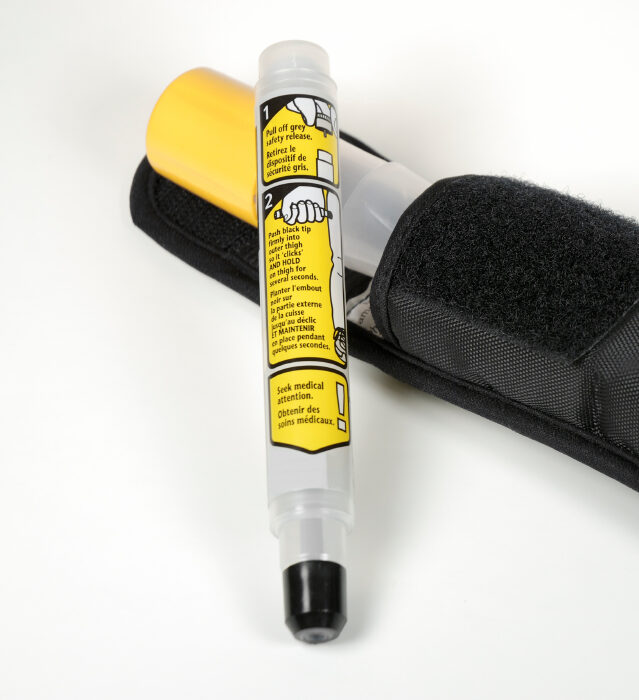
Pharmacists may now keep epinephrine in the form of auto-injector devices such as this one to administer in case of emergency thanks to two new Texas State laws that went into effect Jan. 1.
Pharmacists in Texas can now legally, and without fear of civil reprisal, administer epinephrine through auto-injectors in the event of an emergency. For those suffering from anaphylaxis, such availability of emergency relief could mean the difference between life and death.
To make epinephrine more readily available in emergencies, the Texas Legislature passed House Bill 1550, effective Jan. 1, that expands the availability of epinephrine at pharmacies and allowing pharmacists to administer it.
Pharmacists may now keep epinephrine in the form of auto-injector devices. In the event of an emergency, they also are authorized to administer epinephrine through such an auto-injector device. The use of such epinephrine must be reported to the patient’s primary care physician, if the patient has a primary care physician.
The law shields pharmacists from liability if they administer the drug in such emergency situations and specifically states that such administration of epinephrine is not an unlawful practice of any health care profession. As a result, a person suffering from anaphylaxis has options other than driving to emergency medical center or calling 911.
Prior to this law, pharmacists were unable to legally administer epinephrine. The only response of a pharmacist confronting an emergency was to call 911, even if epinephrine auto-injectors were only an arm’s length away on pharmacy shelves and the pharmacist was competent to administer such lifesaving treatment.
The faster a person suffering anaphylactic shock obtains epinephrine, the greater their chance of recovery. Having the epinephrine auto-injectors at pharmacies increases the chances of a quick, effective and lifesaving response.
The most common cause of anaphylactic shock is food allergies. However, insect stings, for those who suffer allergies to the venom, can also lead to anaphylaxis shock.
Such severe allergic reactions brought by food or insect stings can affect breathing and blood circulation and, in severe cases, lead to death.
As many as one out of every 13 children are at risk of such food allergies. Children who suffer from asthma are at even greater risk. Frequently, the anaphylaxis comes unexpectedly.
The most common foods likely to cause severe reactions are peanuts, tree nuts, milk, eggs, soy, wheat, fish, and shellfish. The most common insects that result in reactions are yellow jackets, honeybees, paper wasps, hornets and fire ants.
If such an anaphylactic shock occurs, the first line of defense is the injection of epinephrine (adrenaline). Many times, the difference between life and death can be a matter of seconds.
HB 1550 is part of legislative policy to expand the availability of epinephrine in the event of an emergency. As of September 2015, a similar law passed by the Texas Legislature went into effect, requiring Texas schools to have epinephrine auto-injecting devices on hand. The bill also required training in their use. Schools were required to have such auto-injector devices available at schools and off-campus school-sponsored events. Similarly, the law also protected those involved in assuring the availability and use of epinephrine auto-injectors from civil and criminal liability.
These are two laws that can help us all breath a little easier.
Andrew Greenwell is a lawyer with a civil trial and appellate practice with a focus on commercial litigation. He was listed as a Super Lawyer in 2011-12 and 2014-15 and a Best Lawyer since 2005.





